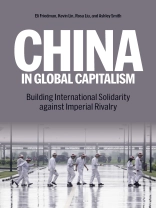As the rivalry between the US and China enters a dangerous new phase, reaffirming the politics of anti-imperialism is a task more important than ever.
From trade wars and pandemic politics to rioting workers, intercontinental balloons, and battles over Tik Tok, the US media tends to present contemporary China—when it’s discussed at all—in sensationalist terms. This portrayal has only intensified as China’s relationship with the United States has grown increasingly hostile. Whether in the form of overtly racist rhetoric and aggressive trade actions, or the more buttoned down but equally antagonistic efforts to oppose Chinese interests abroad, the US has made clear that it has no interest in giving up its position as global hegemon. This seemingly endless cycle of nationalism, jingoism, and reactionary politics on both sides of the Pacific suggests a downward spiral that could plausibly result in catastrophic military confrontation.
Against Imperialism forcefully makes the case that workers and socially marginalized people in both the US and China must oppose our rulers’ claims that they have our best interests in mind as they ratchet up their rivalry. Rather, if we’re to avert nuclear calamity, we must oppose imperialism in all its forms, and regardless of its source and rhetoric.
Through snapshots of China’s growing social movements—from its labor struggles to feminist campaigns, and more—Lin, Liu, Friedman, and Smith provide some of the building blocks we’ll need to construct a movement that centers international solidarity across borders.
Mục lục
Introduction
Part I: The Rise of Chinese Capitalism
Chapter 1: China is Capitalist
Chapter 2: The Emergence of a New Great Power
Part II: Class, Social, and National Struggles
Chapter 3: Class Struggle in the Countryside, Cities, and Factories
Chapter 4: Feminist Resistance and the Crisis of Social Reproduction
Chapter 5: China’s National Questions
Part III: Imperial Rivalry and Crises of Global Capitalism
Chapter 6: The US v. China:The 21st Century’s Central Inter-Imperial Rivalry
Chapter 7: China and Global Capitalism’s Ecological and Climate Crises
Chapter 8: Pandemics in an Epoch of Imperial Rivalry
Part IV: International Solidarity from Below
Chapter 9: “China” in the US: The Roots and Nature of Diasporic Struggles
Conclusion: Neither Washington, Nor Beijing: International Solidarity Against Imperial Rivalry
Giới thiệu về tác giả
Ashley Smith is a socialist writer and activist in Burlington, Vermont. He has written in numerous publications including Truthout, The International Socialist Review, Socialist Worker, Jacobin, New Politics, Against the Current, and many other online and print publications.












